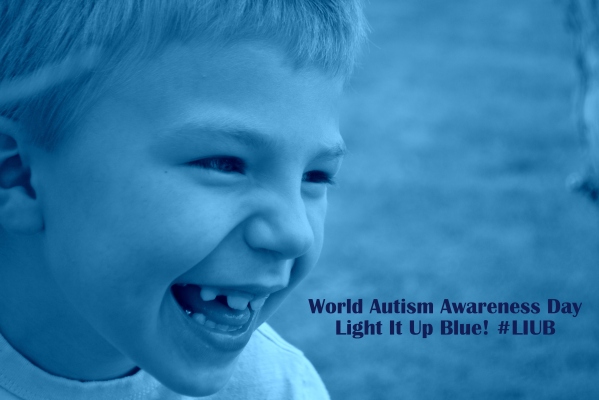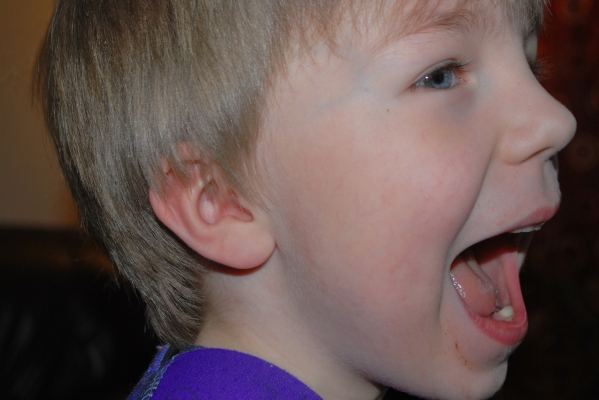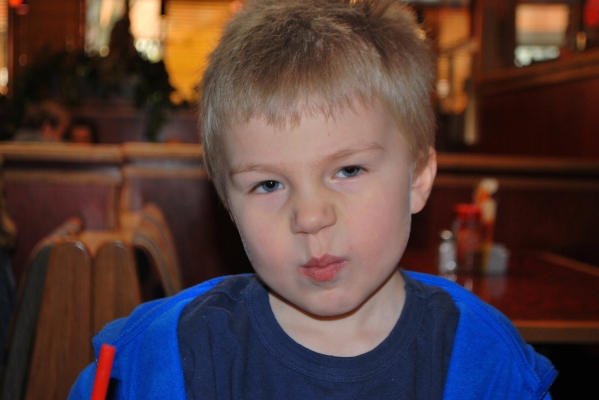Where does the time go? Oh – laundry, dishes, meal times, snacks, playgrounds, play dates, learning, kisses, hugs, church, grocery shopping, bedtimes, baths, fishing strange things out of the toilet, avoiding the lego obstacle course on the way down the hall – oh yeah. It makes sense now.
Still, I intend to squeeze my writing back into these crazy life. I miss the outlet of writing down my thoughts and chronicling the adventures of our family. Homeschooling takes a lot of time and work, yes, but I also want to write about it and share my ideas as well as my frustrations. Autism is a journey with twists and turns that keep us on our toes, and I am disappointed in myself that I haven’t taken the time to write about where we are in that journey lately.
April, National Autism Awareness Month, would have been an ideal time to put up a blog post detailing the latest in David’s progress and improvements. As I do every April, I chose a favorite photo of David from my albums and tinted it blue for my profile pic on Facebook. David came up behind me while I was posting the photo. “Hey, why am I all blue?” he questioned me, giggling a little. I explained that April was a very special month, and in particular, I liked to join the “Light It Up Blue!” campaign each year to bring more awareness to autism. He was very quiet after that explanation. I thought perhaps he was confused by the word awareness and hurried on to clarify that it meant a knowledge of and interest in a subject or cause. He interrupted me to say in a very matter-of-fact manner, “Huh. I always thought autism was spelled with an o and it’s actually an au! Weird.”
And that’s my David for you, always thinking about things in his way and often seeming to completely miss the point. Later, I will often discover, he has absorbed what I said and will discuss it with me then, but in the moment, he will frequently choose to talk about something else, often unrelated. His one-track mind can prove very useful in school when he is excited about the topic at hand. Then he will spend hours immersed in the subject and willingly do writing and art and all sorts of things that he normally resists. However, if I am trying to change the subject, it becomes quite difficult and sometimes impossible. This is a problem when we are all tired of hearing about Mega Man, Ice Man, Fire Man, Stone Man, and all the other characters that I ought to know by heart by now. I am attempting to teach him to be more aware of others around him and to allow them to talk about their interests too. This is challenging for him. Even if he remembers to give the other person a chance to speak, he is impatiently waiting for his turn so he can get back to talking about what he is interested in. Recently, at our church home group, I saw him walk over to a group of junior high girls. He jumped right into his current favorite topic with no preamble and no room for anyone else to talk. I watched, resisting the urge to step in and help. The girls were doing their best to look attentive, but as the minutes ticked by and he showed no signs of winding down, they got a little desperate. Finally, one of the girls interrupted him. “Hey, David, I bet you can’t count all the bricks in that fireplace,” she challenged him. It worked! While he turned to look at the fireplace and start counting the bricks, the girls made their escape to another part of the house. He was unfazed by the girls’ evasion techniques and went on to find another unsuspecting victim. 🙂 In instances like these, I want to shout “He’s autistic, okay? He has a hard time going off topic and can’t read social cues!” But of course I can’t. It’s not an excuse, and I certainly don’t want people to pity him. He has to learn how to operate in these social situations. And how many times have I, his very own mother, pulled the same trick to get out of talking about the same topic again??
David turned eight at the beginning of April, and he is now standing as tall as my shoulders. He is quickly changing from little boy to growing young man. He is making tremendous strides in physical therapy and occupational therapy. In September, he could not catch a ball with one hand and could barely throw it with any accuracy. Now he does both with confidence. His balance is better, and his fine motor skills are improving. There is still a lot of work to be done to build up his core strength, but we are working on that with various exercises each week. When we were doing Monday School with our homeschool co-op, I received great reports from his teachers. He had one class – an art and literature class – that he particularly struggled in because he gets easily overwhelmed by projects and creative thinking. His teacher was patient and helpful, and he learned a lot. I asked him what he learned and he said, “Not to take an art class again.” Ha!
People love being with David and working with him. He is charming and sweet and really does love being with adults. I love having a conversation with him, trying to get a glimpse into that complicated head of his. I cannot imagine him without autism – it is an important part of who he is. We will always be looking for ways to help him and encourage him along this journey. I feel blessed that God saw fit to give him to us, and I do not take my duty and my privilege as his mom lightly.
(For more information on communication difficulties and difficulty reading social cues for autistic children, check out this helpful link at Autism Speaks.)






